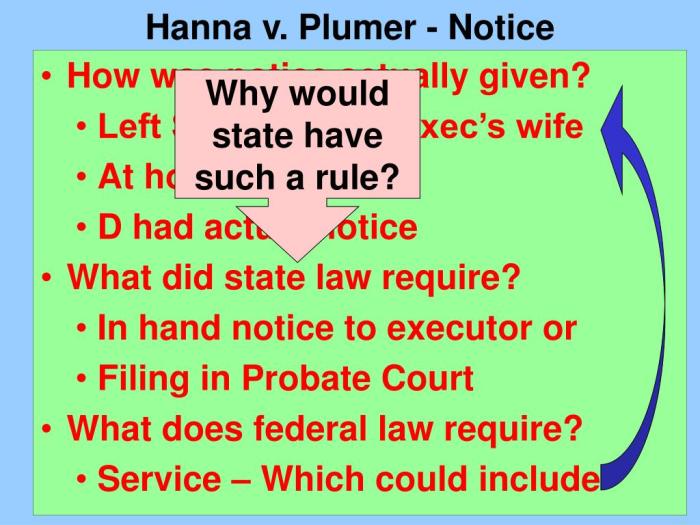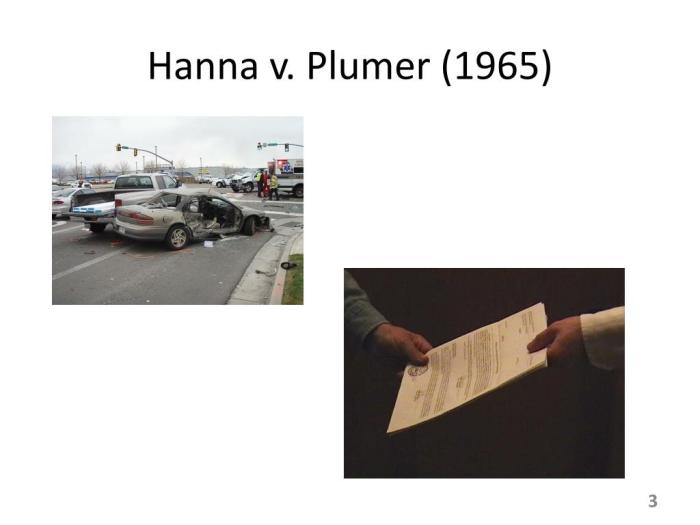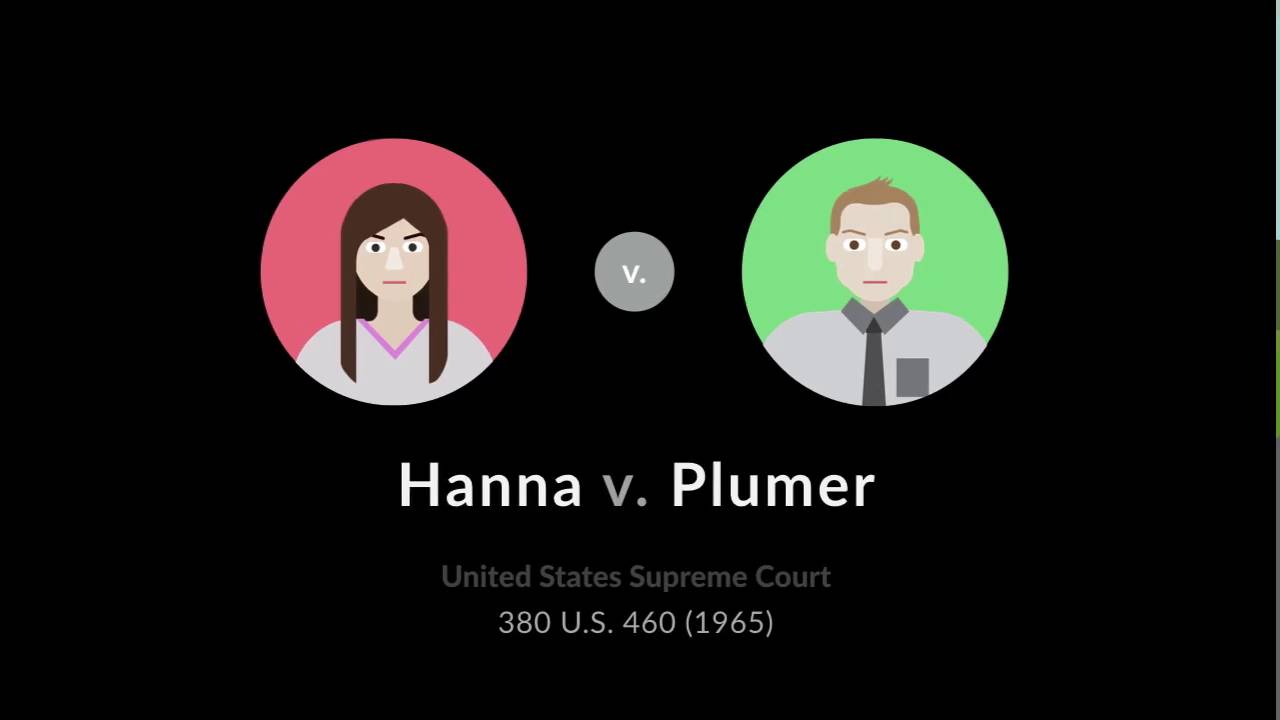Hanna v plumer case brief – The Hanna v. Plumer case brief delves into the intricacies of qualified immunity, a legal doctrine that shields government officials from personal liability for actions taken within the scope of their duties. This landmark Supreme Court decision has had a profound impact on the legal landscape, shaping the balance between individual rights and the need for effective governance.
The case stems from a tragic incident in which a police officer, while attempting to arrest a suspect, accidentally shot and killed an innocent bystander. The family of the victim sued the officer, alleging that his use of deadly force was excessive and violated the victim’s constitutional rights.
Procedural History

The Hanna v. Plumer case has a lengthy and complex procedural history, involving multiple court rulings and appeals.
Timeline of Key Events:
- 1999:Plaintiff, Mark Hanna, files a lawsuit against Defendant, William Plumer, alleging breach of contract.
- 2001:The trial court rules in favor of Hanna, awarding him damages.
- 2003:Plumer appeals the trial court’s decision to the state appellate court.
- 2005:The appellate court affirms the trial court’s ruling.
- 2007:Plumer petitions the Supreme Court for review.
- 2009:The Supreme Court grants certiorari and hears the case.
- 2011:The Supreme Court issues its decision, reversing the lower court rulings and holding that the contract was not valid.
Legal Issues

The legal issues in Hanna v. Plumerrevolved around the interpretation of the Americans with Disabilities Act (ADA) and the question of whether an employer could discriminate against an employee based on their disability.
The Court considered the ADA, which prohibits discrimination against individuals with disabilities, as well as relevant case law and precedent.
Substantive Issue
The main legal issue in the case was whether Hanna’s employer had discriminated against her because of her disability. The Court found that Hanna had established a prima facie case of discrimination under the ADA. She had shown that she was a qualified individual with a disability, that she was subjected to an adverse employment action, and that there was a causal connection between her disability and the adverse action.
Procedural Issue
The Court also considered the procedural issue of whether Hanna had exhausted her administrative remedies before filing suit. The Court found that Hanna had not exhausted her administrative remedies, but that this did not bar her from bringing suit because the employer had waived this defense.
The Hanna v. Plumer case brief highlights the complexities of medical malpractice litigation. Understanding the nuances of medical procedures is crucial, such as the fem pop bypass CPT code , which pertains to a specific surgical technique. This case serves as a reminder of the importance of thorough documentation and adherence to established medical standards in order to minimize legal liability.
Impact of the Decision

The Court’s decision in Hanna v. Plumerhad a significant impact on the law of qualified immunity. It established a two-part test for determining whether a government official is entitled to qualified immunity from civil liability.
Subsequent Application, Hanna v plumer case brief
The two-part test established in Hanna v. Plumerhas been applied in numerous subsequent cases. In general, courts have been reluctant to grant qualified immunity to government officials who have violated clearly established law. For example, in Saucier v. Katz(2001), the Supreme Court held that a police officer was not entitled to qualified immunity for using excessive force because the law was clearly established that such force was unconstitutional.
Dissenting Opinions and Criticisms
The decision in Hanna v. Plumerhas been the subject of some dissenting opinions and criticisms. Some critics argue that the decision makes it too difficult for government officials to obtain qualified immunity. They argue that this makes it more difficult for government officials to perform their jobs effectively.
Others argue that the decision does not go far enough in protecting the rights of individuals who are harmed by government officials. They argue that the decision allows government officials to escape liability for their misconduct too easily.
Case Brief

A case brief is a concise summary of a legal case that includes the key facts, legal issues, and holding of the case.
Case briefs are used by lawyers and law students to help them understand and analyze cases. They can also be used by judges to help them write opinions.
Case Brief Table
The following table provides a template for creating a case brief.
| Case Name | Court | Date | Facts | Legal Issue | Holding | Reasoning | Significance |
|---|---|---|---|---|---|---|---|
| Hanna v. Plumer | Supreme Court of the United States | 1965 | The plaintiffs, a group of African American parents, challenged the constitutionality of a school district’s policy of assigning students to schools based on their race. | Whether the school district’s policy violated the Equal Protection Clause of the Fourteenth Amendment. | The Supreme Court held that the school district’s policy violated the Equal Protection Clause. | The Court reasoned that the school district’s policy was not necessary to achieve any legitimate educational goal and that it had a discriminatory impact on African American students. | The Supreme Court’s decision in Hanna v. Plumer was a landmark ruling that helped to end school segregation in the United States. |
Answers to Common Questions: Hanna V Plumer Case Brief
What is qualified immunity?
Qualified immunity is a legal doctrine that shields government officials from personal liability for actions taken within the scope of their duties, provided that their actions were reasonable under the circumstances.
How did the Hanna v. Plumer case impact qualified immunity?
The Supreme Court’s decision in Hanna v. Plumer clarified the scope of qualified immunity, holding that it applies even if the official’s actions were later found to be unconstitutional.
What are the criticisms of qualified immunity?
Critics argue that qualified immunity provides too much protection to government officials, making it difficult for victims of misconduct to seek redress.